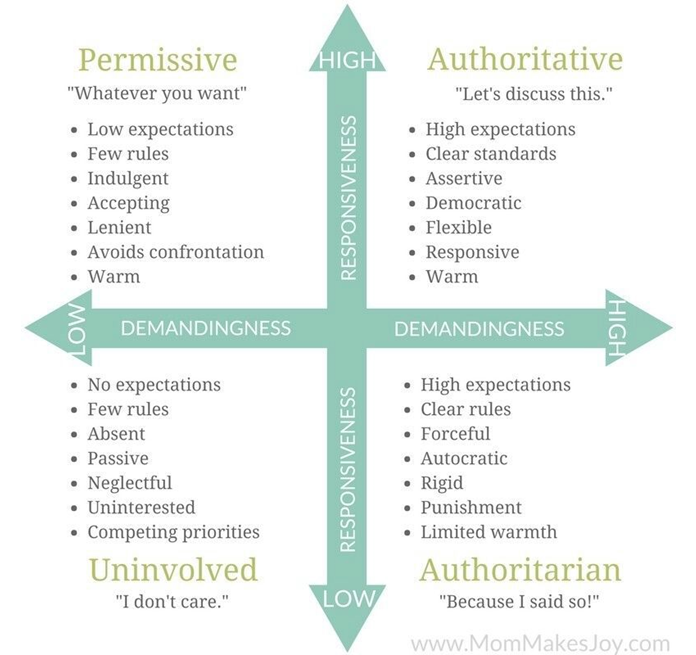Research by Diana Baumrind, a development psychologist, showed that parents fall into four main categories or styles: Permissive, Authoritative, Uninvolved and Authoritarian.
This refers to the overall climate in which they raise their children, rather than the actions they take.
So, with-in each parenting style, the parenting practices will differ. For example, each family will have different rules, but their parenting style will influence the way they interact with the child about those rules.
In simple terms, Permissive parenting is characterised as high responsiveness (warmth) but low demandingness (expectations), whereas on the flip side the Authoritarian style is high on rules and expectations but inflexible and punitive (low on responsiveness).
In contrast, Uninvolved parenting is low on both dimensions meaning that they have few expectations or show little interest in the child.

Authoritative style – for successful outcomes
Overall, it appears the Authoritative style provides an environment that leads to the most successful outcomes from children (better academic performance, social skills and self-esteem).
Authoritative parenting consists of a spectrum of different parenting practices, all based on the same “high responsiveness, high demandingness” principle. However, depending on the situation and temperament of the child, the actions the parent take can vary in terms of demandingness and responsiveness.
Demandingness refers to the extend parents control their children’s behaviour or demand their maturity.
Responsiveness refers to the degree parents are accepting and sensitive to their children’s emotional and developmental needs.
Another term often used for this type of parenting style is Supportive as the style is characterised by warmth and affection (high responsiveness) while maintaining structure and boundaries (high demands).
For example, when a child breaks a rule the Authoritative parent would take the opportunity to discuss the situation in a warm manner and hear the perspective of the child while at the same time making it clear what they expect in the future and explaining why they hold this view.
Why knowing your parenting style matters
Understanding your own parenting styles can be useful and offer insights into ways to manage and improve the relationship that you have with your children. It may change from child to child, or situation to situation, depending on the temperament of the child, and of course the mood of the parent.
Although achieving a balance between demandingness and responsiveness isn’t always possible, keeping them in mind can help when you sense you might be becoming too lenient or too rigid. It may be that in order to regain balance, a little more warmth or a little more assertiveness is needed!
Parent Helpline
If you have found this information useful and would like to talk with one of our trained telephone support workers, give our free Nationwide Parent Helpline a call on 0800 568 856. We are here to talk about any of your parenting concerns. We receive calls about all age groups – from babies to adolescents – and no issue is too big or small.
Related links


